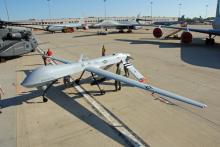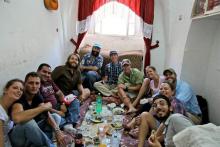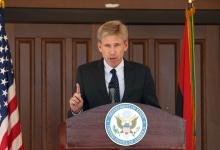Peace and Nonviolence
Ken Butigan writes on Waging Nonviolence about the emergence of a new anti-nuclear weapons movement. The Washington Post recently reported that the U.S. government is planning to refurbish its nuclear weapons complex over the next 10 years at a cost of $352 million. In response, writes Butigan:
“So we are in the midst of the next phase of the movement for nuclear disarmament, where a series of campaigns across the U.S. are pumping life into the seven-decade struggle. … For those of us who first came to political activism by tackling the nuclear arms race in the early 1980s, the announcement that the U.S. is online to refurbish and reassert its nuclear might far into the future has a glumly déjà vu feel. At the same time, we know the power of people power movements to change history. Together we can build on this emerging next phase to take action, to stoke alternatives and to prompt a powerful nationwide debate…”

In a speech last week at the Woodrow Wilson Center in Washington, Yemen’s president Abed Rabbo Mansour Hadiexpressed his support for U.S. drone strikes in that country. According to the New York Times,
“They pinpoint the target and have zero margin of error, if you know what target you’re aiming at,” said Mr. Hadi, a former army officer and the successor to Ali Abdullah Saleh, who stepped down after protests against his three-decade rule.
The United States “helped with their drones because the Yemeni Air Force cannot carry out missions at night,” he said. “The electronic brain’s precision is unmatched by the human brain.”
In an interview with reporters and editors from the Washington Post, Hadi said that he personally approves all drone strikes in Yemen. According to the piece:
“Every operation, before taking place, they take permission from the president,” Hadi said in an interview with reporters and editors from The Washington Post in his hotel suite in the District. …
“Hadi’s comments mark the first time he has publicly acknowledged his direct role in a campaign of strikes by U.S. drones and conventional aircraft targeting an al-Qaeda franchise that is seen as the most potent terrorist threat to the United States.”

People of Jesus work against demons — against the forces of evil that eat away at the goodness of God, the wonder of creation, the life of God in the world. Demonic forces roam the world, corrupting minds and bodies, cultures and governments, trying to bring ruin upon all that is good and beautiful. They dehumanize, devastate, and destroy life.
Weaponized drones are demons: evil spirits of the air, specters in the heavens, shadowy presences. They are forces of evil in heavenly places, triggering mental anxiety and bodily harm, instigating psychological damage and death, raining down terror and trauma.

Researchers at Stanford University and New York University law schools released a major study on the U.S. use of drones in Pakistan, commissioned by a London-based human rights group Reprieve. The study, Living Under Drones, took nine months to complete, including two trips to Pakistan and more than 130 interviews with victims, witnesses and experts. The Bureau of Investigative Journalism is cited in the report for “the best currently available public aggregate data on drone strikes.”
The four major conclusions of the study, highlighted in its executive summary, are:
“First, while civilian casualties are rarely acknowledged by the US government, there is significant evidence that US drone strikes have injured and killed civilians.
“Second, US drone strike policies cause considerable and under-accounted-for harm to the daily lives of ordinary civilians, beyond death and physical injury. Drones hover twenty-four hours a day over communities in northwest Pakistan, striking homes, vehicles, and public spaces without warning. Their presence terrorizes men, women, and children, giving rise to anxiety and psychological trauma among civilian communities.
“Third, publicly available evidence that the strikes have made the US safer overall is ambiguous at best. The strikes have certainly killed alleged combatants and disrupted armed actor networks. However, serious concerns about the efficacy and counter-productive nature of drone strikes have been raised. The number of “high-level” targets killed as a percentage of total casualties is extremely low—estimated at just 2%.
“Fourth, current US targeted killings and drone strike practices undermine respect for the rule of law and international legal protections and may set dangerous precedents. This report casts doubt on the legality of strikes on individuals or groups not linked to the terrorist attacks of September 11, 2011, and who do not pose imminent threats to the US.”
You can read the entire report, along with data, victim’s stories, and resources.
News stories on the study include BBC, Guardian, Chicago Tribune/Los Angeles Times, and CNN.

Editor's Note: The following is a transcript of President Barack Obama's remarks to the UN General Assembly in New York City on Tuesday, in which he condemns global violence and extremism, framing the speech around the recent tragedy at the U.S. consulate in Libya.
THE PRESIDENT: Mr. President, Mr. Secretary General, fellow delegates, ladies and gentleman: I would like to begin today by telling you about an American named Chris Stevens.
Chris was born in a town called Grass Valley, California, the son of a lawyer and a musician. As a young man, Chris joined the Peace Corps, and taught English in Morocco. And he came to love and respect the people of North Africa and the Middle East. He would carry that commitment throughout his life. As a diplomat, he worked from Egypt to Syria, from Saudi Arabia to Libya. He was known for walking the streets of the cities where he worked -- tasting the local food, meeting as many people as he could, speaking Arabic, listening with a broad smile.
Chris went to Benghazi in the early days of the Libyan revolution, arriving on a cargo ship. As America’s representative, he helped the Libyan people as they coped with violent conflict, cared for the wounded, and crafted a vision for the future in which the rights of all Libyans would be respected. And after the revolution, he supported the birth of a new democracy, as Libyans held elections, and built new institutions, and began to move forward after decades of dictatorship.
Chris Stevens loved his work. He took pride in the country he served, and he saw dignity in the people that he met. And two weeks ago, he traveled to Benghazi to review plans to establish a new cultural center and modernize a hospital. That’s when America’s compound came under attack. Along with three of his colleagues, Chris was killed in the city that he helped to save. He was 52 years old.

In the second attack in three days, a drone attack late Monday in northwest Pakistan killed five militants, including two linked to al Qaeda. DAWN reports
“Two key al Qaeda linked operatives, including an operational commander have been killed in Monday’s US drone strike in North Wazirsitan Agency, official sources said.
“The al Qaeda linked militants killed in the drone strike have been identified as Abu Kasha Al-Iraqi and Saleh Al-Turki, an intelligence source told Dawn.Com.
“Abu Kasha Al-Iraqi, hailing from Iraq, had arrived in North Waziristan Agency in 2001 and had since been one of the key operational commanders of the al Qaeda in North Waziristan tribal region, intelligence officials said.”
The Associated Press and Agence France Presse carried earlier reports of the story, before the identifications were made.

Al Jazeera reports:
“At least three people have been killed in a suspected US drone attack in Pakistan's northwestern region along the Afghan border, according to a Pakistani security official.
“The target of Saturday’s attack was a vehicle in Dattakhel area in North Waziristan, one of seven tribal districts and hotbed of al-Qaeda-linked fighters. All three people travelling in the car were killed and the vehicle completely destroyed, the security official said on condition of anonymity.”
The attack was also reported in Pakistani newspapers DAWN and The Nation.

My heart is heavy.
Every day for the last week, media outlet have told their version of the current uprising stretching across the Middle East (Egypt, Libya, Yemen). Whether it’s pictures of embassies burned to the ground, rioting citizens, or highly politicized comics, the surge of content has been anything but “feel-good” and hopeful.
And that’s because the events and corresponding responses have been anything but “feel-good” and hopeful.
My heart breaks because I know the events that are unfolding do not represent the majority of those who inhabit the Middle East. I spend a significant amount of time in there and have built deep, life-long friendships.
Just two weeks ago I sat around a table and shared a meal with Christians, Jews and Muslims in the home of a devout Muslim family in the region. A day after that, I served alongside Muslim youth workers who are promoting non-violence and reconciliation in the face of oppression and poverty.
On the same day, I sat with an Arab Christian who embodied Jesus’ teaching in the Sermon on the Mount in dealing with daily injustice by saying, “We refuse to be enemies.” Lastly — and what keeps playing over and over in my head — are the words spoken to me by a Muslim friend named Omar who said,
“Please give this message to all of your American friends. We (Arab Muslims and Christians) desire peace. The violence you see in the news does not represent us. It is not the majority, it is the smallest minority of extremism. Please listen to our story and accept our friendship.”

BEIRUT — As violent protests against an anti-Islam film spread to much of the Muslim world on Friday, Pope Benedict XVI arrived in Lebanon to a warm welcome from Christian and Muslim leaders.
The pontiff's appeal for peace and reconciliation in the region, however, stood in jarring contrast with violent clashes in the northern Lebanese city of Tripoli, which left one dead and 25 injured.
Landing at Beirut's airport in the early afternoon, Benedict praised Lebanon as an example of "coexistence and respectful dialogue between Christians and their brethren of other religions."
Without referring expressly to the unrest, the pope warned that the country's "equilibrium" is "extremely delicate."

AP Intelligence Writer Kimberly Dozier reports
“WASHINGTON (AP) - The U.S. is sending more spies, Marines and drones to Libya, trying to speed the search for those who killed the U.S. ambassador and three other Americans, but the investigation is complicated by a chaotic security picture in the post-revolutionary country, and limited American and Libyan intelligence resources. The CIA has fewer people available to send, stretched thin from tracking conflicts across the Middle East, Africa and Asia.”
…
“To fill in the gaps in spies on the ground, the U.S. intelligence community has kept up surveillance over Libya with unmanned and largely unarmed Predator and Reaper drones, increasing the area they cover, and the frequency of their flights since the attack on the consulate, as well as sending more surveillance equipment to the region, one official said.”
“Largely unarmed?”

The Associated Press reports
“BENGHAZI, Libya (AP) — U.S. drones hovered over the eastern city of Benghazi on Friday and militia forces fired toward the crafts, prompting authorities to close the airport for several hours for fear a commercial aircraft could be hit, Libyan officials said.
“Abdel-Basit Haroun, the head of the militia in charge of city security, said the drones could easily be spotted from the ground. He says men angry over perceived foreign intervention fired in the air and authorities closed the airport.
"The drones are like bees," he said, referring to the long hours the drones were seen, with their buzzing noise heard in different neighborhoods of Benghazi. Militias, known as brigades, fought regime forces during Libya's eight-month civil war that led to Moammar Gadhafi's fall last year. Since then, many have roles in keeping security, though they have not been integrated into government forces.
“An airport official confirmed the firing on the drones was the reason for the airport shutdown.”

Micah Zenko, at the Council on Foreign Relations blog, points to a recently declassified report from the Government Accountability Office (GAO) on the spread of drones. The report, Agencies Could Improve Information Sharing and End-Use Monitoring on Unmanned Aerial Vehicles, finds:
“Since 2005, the number of countries that acquired an unmanned aerial vehicle (UAV) system nearly doubled from about 40 to more than 75. In addition, countries of proliferation concern developed and fielded increasingly more sophisticated systems. Recent trends in new UAV capabilities, including armed and miniature UAVs, increased the number of military applications for this technology. A number of new civilian and commercial applications, such as law enforcement and environmental monitoring, are available for UAVs, but these applications are limited by regulatory restrictions on civilian airspace.
“The United States likely faces increasing risks as countries of concern and terrorist organizations seek to acquire UAV technology. Foreign countries’ and terrorists’ acquisition of UAVs could provide them with increased abilities to gather intelligence on and conduct attacks against U.S. interests. For instance, some foreign countries likely have already used UAVs to gather information on U.S. military activities overseas. Alternatively, the U.S. government has determined that selected transfers of UAV technology support its national security interests by providing allies with key capabilities and by helping retain a strong industrial base for UAV production. For instance, the United Kingdom and Italy have used UAVs purchased from the United States to collect data on Taliban activity in Afghanistan.”

In a lecture Thursday evening at Drake University in Des Moines, Iowa, former President Jimmy Carter included drone killings in a list of human rights violations. The Muscatine Journal reported:
“Former President Jimmy Carter said Thursday that America is engaging in — and its citizens are accepting — human rights violations that “would never have been dreamed of” before the terrorist attacks that occurred in this country 11 years ago.
“The nation’s 39th president said the U.S. government under both Republican and Democratic administrations has violated 10 of 30 provisions set out in a universal declaration of human rights that was forged after World War II, including perpetually detaining people in prison without informing them of any charges, providing them access to legal counsel or bringing them to trial and, more recently, by killing people via the use of unmanned drones.
“We have now decided as a nation that it’s OK to kill people without a trial with our drones, and this includes former American citizens who are looked upon as dangerous to us,” Carter told a group of Drake University students involved in a social-justice learning program.”

The Vatican confirmed on Wednesday that Pope Benedict XVI's visit to Lebanon will go ahead as planned, despite growing tension in the region after the killing of the U.S. ambassador to Libya by a mob enraged by an anti-Islam film.
The Vatican's chief spokesman, the Rev. Federico Lombardi, said the Vatican was closely monitoring developments in the region but there were no signs of specific security concerns for Benedict's trip so far.
Benedict is scheduled to leave Friday for a three-day visit to Lebanon despite rising instability spilling over from a deadly civil war in neighboring Syr
Editor's Note: The following is the statement by Secretary of State Hillary Clinton following the tragic events in Libya Tuesday evening.
Yesterday, our U.S. diplomatic post in Benghazi, Libya was attacked. Heavily armed militants assaulted the compound and set fire to our buildings. American and Libyan security personnel battled the attackers together. Four Americans were killed. They included Sean Smith, a Foreign Service information management officer, and our Ambassador to Libya Chris Stevens. We are still making next of kin notifications for the other two individuals.
This is an attack that should shock the conscience of people of all faiths around the world. We condemn in the strongest terms this senseless act of violence, and we send our prayers to the families, friends, and colleagues of those we’ve lost.

I just arrived in Tennessee for a little sabbatical in the hills where I grew up. As I settled into my old childhood room again for a week or so of rest, I noticed a pile of newspaper articles my mom placed by the toilet. She's gotten into the habit of putting clippings of articles there that she thinks I'll enjoy reading while having my special time in the bathroom.
One of the articles was an extraordinary front-page story in the Knoxville News Sentinel about three peace activists who shut down the Y-12 nuclear plant last month in Oak Ridge for more than weeks.
In the predawn hours of July 28, three unarmed peace activists entered the Y-12 nuclear plant and, over a matter of hours, made their unprecedented way through the layers of security to the very heart of the facility, where they performed a prayerful service, hung "crime-scene" tape and poured human blood as a symbol of the violence of nuclear weapons. One of the intruders was an 82-year-old nun who is now an international celebrity. It's a contemporary story of David and Goliath, the shepherd boy who took on a giant with nothing but a slingshot.
The article makes a spectacle of how these three folks, whose average age was 67, managed to mosey into one of the most highly secure and potentially deadly facilities in the world. But they chose the spot for a reason.
The Oak Ridge Y-12 plant was responsible for the explosives of the Hiroshima bomb. It has been called "the Fort Knox of Uranium." The Y-12 plant is the nation's primary supplier of bomb-grade uranium, and has played a role in the manufacture of every nuclear weapon in the U.S. arsenal, which now flaunts the capacity of more than 50,000 Hiroshima-size bombs.

As the number of drone attacks on Pakistan and Yemen continue to increase, protests against them are growing.
On Sunday, some 40 people gathered to protest near the New York Air National Guard headquarters at Hancock Field in DeWitt, N.Y. The Syracuse Post-Standard reported
“The group Upstate Coalition to Ground the Drone and End the Wars chose Sunday for its event because the 174th Fighter Wing at Hancock was changing its name to 174th Attack Wing, which reflects the change in mission at the base from flying fighter aircraft to MQ-9 remotely piloted aircraft.”
On Monday, two activists were convicted in federal court for trespassing at Whiteman Air Force Base in Missouri while protesting the use of drones. The Associated Press reported
“Retired minister Ron Faust of suburban Kansas City and Brian Terrell, a member of the Catholic Worker Movement from Maloy, Iowa, were among a group of 40 protesters who demonstrated at the air base in mid-April. They were arrested after entering a restricted area without permission.”
…
“We were there not to commit a crime, but to prevent one,” Terrell said, describing seeing in person a 9-year-old girl in an Afghani refugee camp missing an arm from what he said was a wayward drone strike. … Faust, a 69-year-old retired Disciples of Christ minister, compared drone strikes to ‘premeditated murder’ that cheapen the value of human life by allowing shooters to be as detached from their targets as video game players.”

According to Reuters, the U.S. Ambassador to Libya, Christopher Stevens, and three other embassy staff were killed outside a consular building as it was rushed by a mob angered about a U.S. online film insulting the Prophet Mohammad.
"The Libyan official said the ambassador, Christopher Stevens, was being driven from the consulate building to a safer location when gunmen opened fire.
'The American ambassador and three staff members were killed when gunmen fired rockets at them,' the official in Benghazi told Reuters."

My children don't remember.
I mean, the younger children in my church don't remember. It was eleven years ago. The oldest of them was six when the towers were destroyed and we went to war. I'm wondering how I talk to them about it. I wonder how I tell them the story without subjecting them to the trauma so many people experienced that day.
So, no video footage. No point in giving the kids nightmares. I'm just going to talk about how many kinds of religions there are in the United States. No longer simply a liberal posture, it's an issue of national security, no? If we want to be at peace with our neighbors locally and globally, we need to understand them. We need to have something to work with, some kind of conecpt of how they live.
In September, 2003, I wrote a piece for Sojourners magazine on the "Project for the New American Century," a neo-con organization to which a number of key Bush administration officials had belonged, including Vice President Richard Cheney and Defense Secretary Donald Rumsfeld. In its grand plan for the future, released in September 2000, it urged a “transformation” of the American military into a robust global presence capable of fighting multiple wars, with a network of bases in critical regions around the world. But, the report said, this transformation was "likely to be a long one, absent some catastrophic and catalyzing event—like a new Pearl Harbor."
From its beginning, the project was obsessed with Iraq.
Only days later after the catastrophic 9/11 attacks, the Project released a letter arguing that "even if evidence does not link Iraq directly to the attack, any strategy aiming at the eradication of terrorism and its sponsors must include a determined effort to remove Saddam Hussein from power in Iraq."
Now it seems that strategy began well before 9/11. In a New York Times op-ed this morning, author Kurt Eichenwald wrote of the series of briefings the Bush White House received from the CIA in the spring and summer of 2001, all warning of an attack to come.